
The flags of the Confederate States of America have a history of three successive designs during the American Civil War. The flags were known as the "Stars and Bars", used from 1861 to 1863; the "Stainless Banner", used from 1863 to 1865; and the "Blood-Stained Banner", used in 1865 shortly before the Confederacy's dissolution. A rejected national flag design was also used as a battle flag by the Confederate Army and featured in the "Stainless Banner" and "Blood-Stained Banner" designs. Although this design was never a national flag, it is the most commonly recognized symbol of the Confederacy.

Ross Robert Barnett was an American politician and segregationist who served as the 53rd governor of Mississippi from 1960 to 1964. He was a Southern Democrat who supported racial segregation.
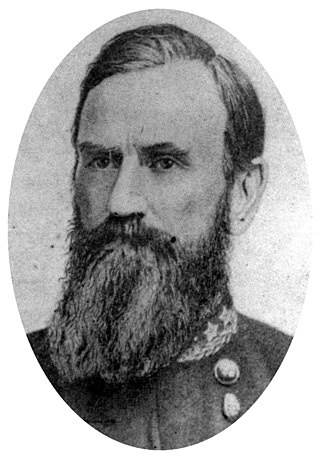
Benjamin Grubb Humphreys was an American politician from Mississippi. He was a general in the Confederate States Army during the American Civil War and served as Governor of Mississippi from 1865 to 1868, during Reconstruction.

The Confederate States Army, also called the Confederate Army or the Southern Army, was the military land force of the Confederate States of America during the American Civil War (1861–1865), fighting against the United States forces to win the independence of the Southern states and uphold and expand the institution of slavery. On February 28, 1861, the Provisional Confederate Congress established a provisional volunteer army and gave control over military operations and authority for mustering state forces and volunteers to the newly chosen Confederate States president, Jefferson Davis (1808-1889),. Davis was a graduate of the United States Military Academy, on the Hudson River at West Point, New York, colonel of a volunteer regiment during the Mexican–American War (1846-1848). He had also been a United States senator from Mississippi and served as U.S. Secretary of War under 14th President Franklin Pierce. On March 1, 1861, on behalf of the new Confederate States government, Davis assumed control of the military situation at Charleston Harbor in Charleston, South Carolina, where South Carolina state militia had besieged the longtime Federal Fort Sumter in Charleston harbor, held by a small U.S. Army garrison under the command of Major Robert Anderson. (1805-1871). By March 1861, the Provisional Congress of the Confederate States meeting in the temporary capital of Montgomery, Alabama, expanded the provisional military forces and established a more permanent regular Confederate States Army.
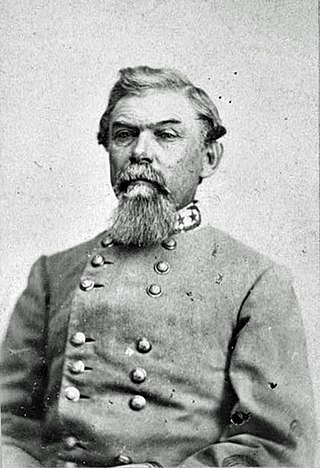
William Joseph Hardee was a career U.S. Army and Confederate States Army officer. For the U.S. Army, he served in the Second Seminole War and in the Mexican–American War, where he was captured and exchanged. In the American Civil War, he sided with the South and became a general. Hardee served in the Western Theater and quarreled sharply with two of his commanding officers, Braxton Bragg and John Bell Hood. He served in the Atlanta Campaign of 1864 and the Carolinas Campaign of 1865, where he surrendered with General Joseph E. Johnston to William Tecumseh Sherman in April. Hardee's writings about military tactics were widely used on both sides in the conflict.
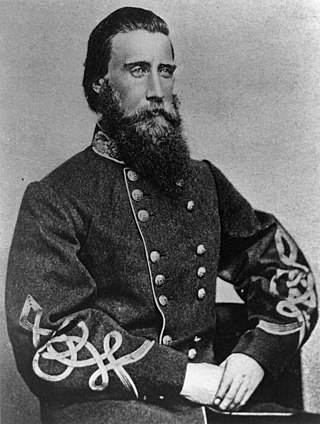
John Bell Hood was a Confederate general during the American Civil War. Hood's impetuosity led to high losses among his troops as he moved up in rank. Bruce Catton wrote that "the decision to replace Johnston with Hood was probably the single largest mistake that either government made during the war." Hood's education at the United States Military Academy led to a career as a junior officer in the infantry and cavalry of the antebellum U.S. Army in California and Texas. At the start of the Civil War, he offered his services to his adopted state of Texas. He achieved his reputation for aggressive leadership as a brigade commander in the army of Robert E. Lee during the Seven Days Battles in 1862, after which he was promoted to division command. He led a division under James Longstreet in the campaigns of 1862–63. At the Battle of Gettysburg, he was severely wounded, rendering his left arm mostly useless for the rest of his life. Transferred with many of Longstreet's troops to the Western Theater, Hood led a massive assault into a gap in the Union line at the Battle of Chickamauga but was wounded again, requiring the amputation of his right leg.

The flag of Mississippi consists of a white magnolia blossom surrounded by 21 stars and the words "In God We Trust" written below, all put over a blue Canadian pale with two vertical gold borders on a red field. The topmost star is composed of a pattern of five diamonds, an Indigenous symbol; the other 20 stars are white, as Mississippi was the 20th state to join the Union. The flag was adopted on January 11, 2021.

Edward Douglass White Jr. was an American politician and jurist. White, a native of Louisiana, was a U.S. Supreme Court justice for 27 years, first as an associate justice from 1894 to 1910, then as the ninth chief justice from 1910 until his death in 1921. White is known for siding with the Supreme Court majority in Plessy v. Ferguson, which upheld the legality of state segregation.

Stephen Dill Lee was an American officer in the Confederate Army, politician, and first president of Mississippi State University from 1880 to 1899. He served as lieutenant general of the Confederate States Army in the Eastern and Western theaters of the American Civil War.

Earl Van Dorn was an American Major General who started his military career as a United States Army officer and became famous for successfully leading a defense of a Native American settlement from the Comanche. He joined Confederate forces in 1861 after the Civil War broke out and was a Major General when he was killed in a private conflict.

Thomas John Wood was a career United States Army officer. He served in the Mexican–American War and as a Union general during the American Civil War.

Richard "Dick" Taylor was an American planter, politician, military historian, and Confederate general. Following the outbreak of the American Civil War, Taylor joined the Confederate States Army, serving first as a brigade commander in Virginia and later as an army commander in the Trans-Mississippi Theater. Taylor commanded the District of West Louisiana and opposed United States troops advancing through upper northwest Louisiana during the Red River Campaign of 1864. He was the only son of Zachary Taylor, the 12th president of the United States. After the war and Reconstruction, Taylor published a memoir about his experiences.

The western theater of the American Civil War encompassed major military operations in the states of Alabama, Georgia, Florida, Mississippi, North Carolina, Kentucky, South Carolina and Tennessee, as well as Louisiana east of the Mississippi River. Operations on the coasts of these states, except for Mobile Bay, are considered part of the Lower Seaboard Theater. Most other operations east of the Appalachian Mountains are part of the eastern theater. Operations west of the Mississippi River took place in the trans-Mississippi theater.
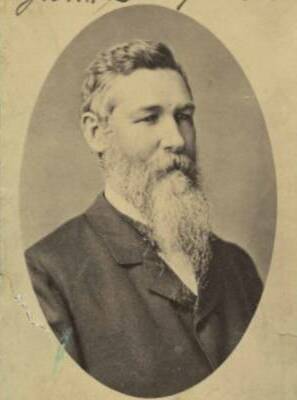
Josiah Abigail Patterson Campbell was an American politician and lawyer who served as the Chief Justice of the Supreme Court of Mississippi, and was previously a Speaker of the Mississippi House of Representatives and Deputy from Mississippi to the Provisional Congress of the Confederate States from 1861 to 1862.

Major-General Joseph Robert Davis was an American politician and lawyer who served as the commanding general of the Mississippi National Guard from 1888 to 1895. During the American Civil War, he served as aide-de-camp to the President of the Confederate States and commanded a brigade in the Army of Northern Virginia. He is best known for his role at Gettysburg. A member of the Democratic Party, he represented Madison and Scott counties in the Mississippi Senate from 1860 to 1861.

Mississippi was the second southern state to declare its secession from the United States, doing so on January 9, 1861. It joined with six other southern states to form the Confederacy on February 4, 1861. Mississippi's location along the lengthy Mississippi River made it strategically important to both the Union and the Confederacy; dozens of battles were fought in the state as armies repeatedly clashed near key towns and transportation nodes.
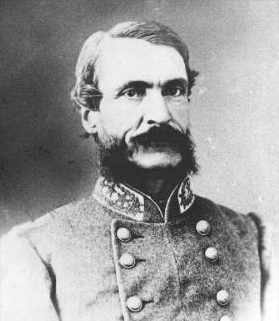
James Patton Anderson was an American slave owner, physician, lawyer, and politician, most notably serving as a United States Congressman from the Washington Territory, a Mississippi state legislator, and a delegate at the Florida state secession convention to withdraw from the United States. He also served in the American Civil War as a general in the Confederate States Army, serving in the Army of Tennessee.

James Ronald Chalmers was an American politician and senior officer of the Confederate States Army who commanded infantry and cavalry in the Western Theater of the American Civil War.
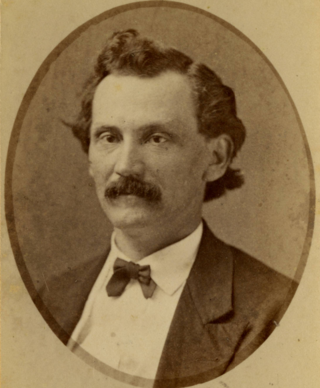
Kinloch Falconer was a newspaper editor, officer in the Confederate Army, lawyer, and the 24th Mississippi Secretary of State.

LeRoy Franklin Youmans was a lawyer, state representative, officer in a mounted riflemen unit of the Confederate Army, U.S. Attorney, South Carolina Attorney General, and state supreme court judge who lived in Charleston, South Carolina. He was born in Beaufort County, South Carolina. He graduated from South Carolina University in 1852.




















